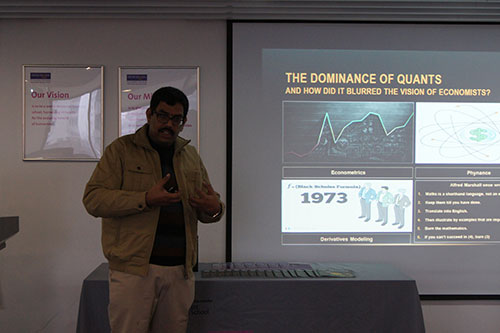菜单
日期:2017-03-12 浏览:2348作者:UOM
On 12th March 2017, Dr. Srinivas Yanamandra, DBA alumnus of Alliance Manchester Business School, was invited to give our alumni a speech on Crisis in Economics and Economics in Crisis. Dr. Yanamandra is a qualified accountant by management qualification, and has 16 years of post-qualification experience in bank governance and regulation. Besides his academic achievements, he also authored two banking fiction titles. Dr. Yanamandra is now BRICS Chief Compliance at New Development Bank based in Shanghai. He arrived in Shanghai only in January and got in touch with the China Centre ever since.
2017年3月12日,曼彻斯特商学院2013届工商管理博士校友Srinivas Yanamandra,应学校邀请,来到曼彻斯特大学中国中心,为校友分享了一场关于‘经济危机及危机中的经济’的演讲。Yanamandra博士本身是一名注册会计师,有着16年的银行业治理与监管经验。此外,他还编写了两本 关于银行业的小说。Yanamandra博士今年一月刚刚来沪,现在长驻上海,任金砖国家开发银行首席合规官。

The Global Financial Crisis of 2007 caused a huge financial and economic loss to lots of countries. Its impact was so huge that it exposed the prevalent weaknesses in mainstream economics. In particular, critics argue that while free market capitalism is extensively covered in mainstream economics, its excessive emphasis resulted in laxity in role of regulatory agencies at systemic level and absence of risk-oriented conduct & culture at financial institution level.
Post the crisis, policy environment is being rapidly subjected to change, in order to address the criticism. During the session, Dr. Yanamandra introduced the mainstream economics before and in the context of global financial crisis, and then the changes that are occurring in economic thinking post the financial crisis. He also introduced the main changes on financial institutions and management education.
For example, a new study called Neural Economics has therefore been adopted. It studies how economic behavior can shape our understanding of the brain, and how neuroscientific discoveries can constrain and guide models of economics. He also recommended new books in Economics, in particular, a book called The Econocracy. Its three authors are founding members of the Post-Crash Economics Society at the University of Manchester. In the end, Dr. Yanamandra summed up the whole speech by one very useful slide (shown below).
2007年的金融危机席卷全球,造成了巨大的经济损失。人们从此开始意识到主流经济学中存在的种种不足。批评者认为当时的主流经济学过于推崇自由市场资本主义,导致监管机构未能有效履职、金融机构未能建立有效抗风险行为及文化。后危机时代,政策环境急剧改变,以期逐步解决这些问题。分享会上,Yanamandra博士分别介绍了危机爆发前、中的主流经济学,以及危机过后的主要变化。他举例,这之后产生了一门新的研究理论‘神经经济学’,主要研究经济相关行为是如何塑造我们对大脑的理解,以及神经科学的发现如何限制并引导经济学模型。他同时推荐了几本有关经济学的新书。其中,《The Econocracy》的三位作者是曼彻斯特大学Post-Crash Economics社团的创始成员。最后,Dr. Yanamandra用一张slide为本次分享做了一个非常有用的总结(如下)。

It was a rainy Sunday afternoon. We still have some alumni coming to the China Centre to join the event. One alumni attendant commented that it was a useful sharing. We have quite a few alumni engaged in financial area and in future we shall have more of such sharing.
虽然是周日下午,又遇上雨天,但仍有一些校友专程赶到中国中心参加此次活动。校友觉得Dr. Yanamandra分享的内容十分有用,我们校友中有不少来自金融行业,希望下次能邀请他再次给校友分享。